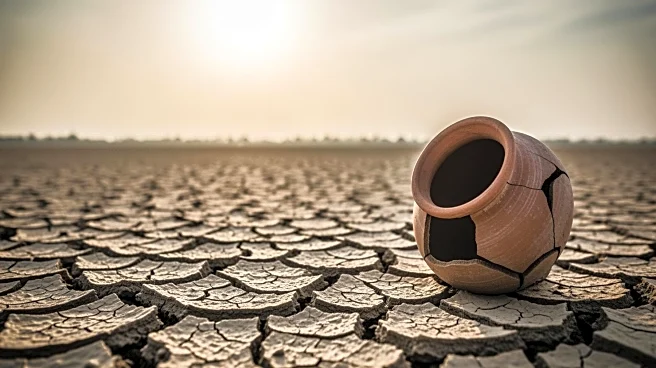What's Happening?
Tehran, Iran's capital, is experiencing a severe water crisis due to an unprecedented drought, marking the driest autumn in nearly 60 years. The city, home to approximately 10 million residents, has begun
rationing water with nightly pressure cuts. The drought has left one of Tehran's major reservoirs completely dry and another at less than 8% capacity. The Karaj Dam, a critical source of drinking water, has only two weeks of supply left. The crisis extends beyond Tehran, affecting Mashhad, Iran's second-largest city, where water reserves have dropped below 3% capacity. President Masoud Pezeshkian has warned that Tehran may need to evacuate if the situation does not improve, although this is considered unlikely due to logistical challenges.
Why It's Important?
The water crisis in Tehran highlights the broader environmental challenges facing Iran, exacerbated by climate change and geopolitical isolation. Iran's agricultural sector, which consumes up to 90% of the country's water, is a significant driver of the crisis. The country's isolation due to sanctions has hindered access to advanced water technologies, further complicating the situation. The crisis underscores the need for sustainable water management practices and could serve as a warning to other cities globally facing similar challenges. The potential evacuation of Tehran would have significant humanitarian and economic implications, affecting millions of residents and the country's political stability.
What's Next?
If the drought continues, Tehran may face Day Zero, where it can no longer supply drinking water to its residents. The government may need to implement formal water rationing and explore alternative solutions, such as relocating the capital, although this is unpopular and logistically challenging. The crisis may prompt international attention and pressure for Iran to adopt more sustainable water management practices. Cities worldwide, particularly in arid regions, may need to reassess their water strategies to prevent similar crises.
Beyond the Headlines
The water crisis in Tehran could exacerbate existing ethnic tensions within Iran, as water is sometimes transported from one region to another, leading to fears of intentional deprivation among certain ethnic groups. The crisis also highlights the role of the 'water mafia,' a network allegedly driving megaprojects for personal gain, contributing to Iran's water bankruptcy. The situation may influence Iran's geopolitical relations, as neighboring countries with advanced desalination technologies could play a role in addressing the crisis.









